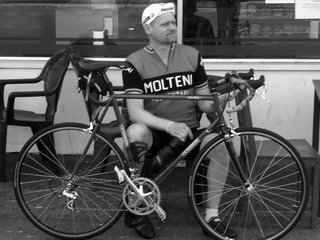 I believe I am reading “with”; are you all reading?). As I reread the material, two of the three pieces seem “unusual” for a college course. One piece, a chapter from the ubiquitous Rules for Writers (Hacker rules!), sounds and feels like pretty typical college reading. But we are matching that handbook chapter with a chapter form Frances Moore Lappé’s Democracy’s Edge and the introduction to the second edition of Peter Elbow’s Writing without Teachers. Lappé and Elbow create an odd context for Hacker. They talk frankly about learning and about how school has interfered (Elbow’s book first appeared in 1973) and does interfere (Lappé is responding in 2006 to No Child Left Behind and testing and such) with learning. I have offered these texts as a launching pad for a ten-week exploration of higher education and its status in the U.S. democracy. In reflection, it’s a potentially confusing and, I think, powerful context.
I believe I am reading “with”; are you all reading?). As I reread the material, two of the three pieces seem “unusual” for a college course. One piece, a chapter from the ubiquitous Rules for Writers (Hacker rules!), sounds and feels like pretty typical college reading. But we are matching that handbook chapter with a chapter form Frances Moore Lappé’s Democracy’s Edge and the introduction to the second edition of Peter Elbow’s Writing without Teachers. Lappé and Elbow create an odd context for Hacker. They talk frankly about learning and about how school has interfered (Elbow’s book first appeared in 1973) and does interfere (Lappé is responding in 2006 to No Child Left Behind and testing and such) with learning. I have offered these texts as a launching pad for a ten-week exploration of higher education and its status in the U.S. democracy. In reflection, it’s a potentially confusing and, I think, powerful context.Why? Lappé, while her focus is on public secondary education, offers a thesis about the purpose of education that catches us all in a sort of bind. She says what we believe but not what we expect:
[Education is about] developing the capacity to be responsible for oneself, to
know oneself well enough to discover one’s own passions and how to feed them
through a life-time of learning and satisfying work, to be able to collaborate
in creating communities that work for all, and to have the courage to stand up
for what’s right even when it’s unpopular (254)
She does not dodge the need for new knowledge or skilled performance, but she declares that education has to be about the development of learners. The bind here is that learners and teachers live in fear of grades and degrees and graduate school. We more often than not wonder “when will I use this” or “how does this pay” and lose our focus on how learners need to grow. Lappé challenge me (and I hope us) and I wonder if we will be willing to take up the challenge she borrows from John Dewey: see education as the practice of living well and not preparing to live well in the future; that is, learn and act in the world in which you live (267).
This thesis has huge implications for how we (these writers and I) need to look at our research and discussions and writing. We are, if we respond to Lappé’s challenge, doing work for our communities and society. We are acting as citizens.
Elbow deepens this challenge in a variety of ways. What strikes me most is his “believing game”:
a disciplined and methodological use of believing, listening, affirming,
entering in, attending to one’s experience, and trying to share one’s experience
with others (xxi)
For me, Elbow’s “nonargument” names the sort of “argument” that democratic citizens do, the sort of work that we should see ourselves engaging with and for our communities (local and global). Citizens notice problems and opportunities around them, and they shoot off their mouthes but also listen and wonder and consider and try out ideas and ventures and solutions on their friends and fellow citizens. Citizens reflect on and see if their community is (because of these ideas and ventures and solutions) being conserved or saved or improved or transformed or whatever.
Democratic citizens. College writers. The link here excites me. Can we (these writers and I) move beyond “doubting” (“criticizing, debating, arguing, and trying to extricate oneself from any personal involvement with ideas through using logic”) to “believing” and then put the two games in play together? That might be fun. In my mind, we would arrive at a place where “arguing” becomes productive for us as individuals and communities.

No comments:
Post a Comment